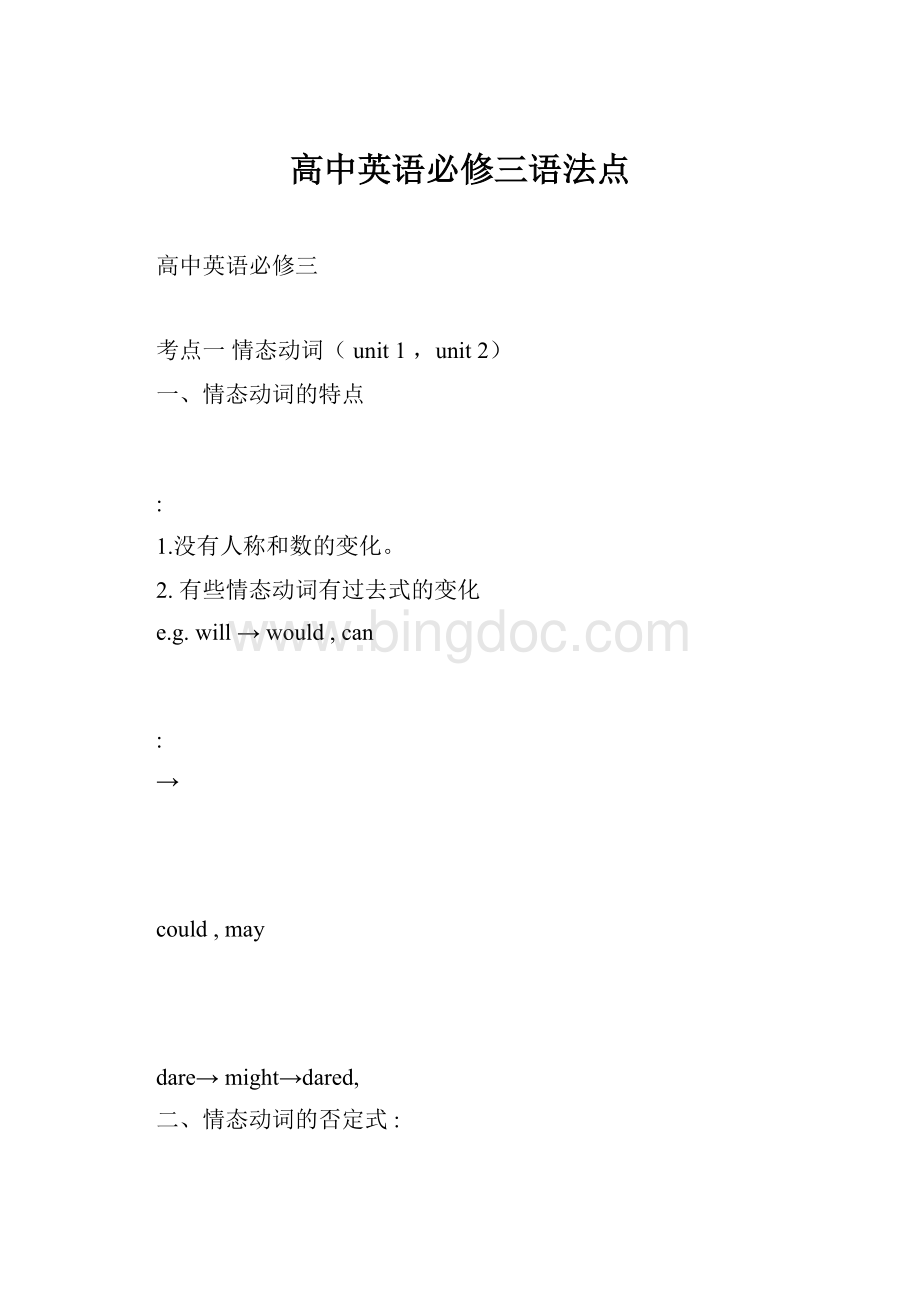高中英语必修三语法点.docx
《高中英语必修三语法点.docx》由会员分享,可在线阅读,更多相关《高中英语必修三语法点.docx(22页珍藏版)》请在冰点文库上搜索。

高中英语必修三语法点
高中英语必修三
考点一情态动词(unit1,unit2)
一、情态动词的特点
:
1.没有人称和数的变化。
2.有些情态动词有过去式的变化
e.g.will→would,can
:
→
could,may
dare→might→dared,
二、情态动词的否定式:
情态动词+not+动词原形cannot:
can't,mustnot:
mustn't,neednot:
needn't
三、情态动词的用法及相互区别,是考试的内容之一
1.can,beableto
beableto
表示经过努力后
能够做到
;beableto
有多种形式的变
化。
can
1).表示体力或脑力方面的能力;
2).表示允许、可能性。
could是can的过去式,表示过去有能力及过去存在的可能性
;用于疑问句表示委婉地
提出问题。
1)Thefirespreadthroughthehotelveryquicklybuteveryone____getout.
A.hadtoB.wouldC.couldD.wasableto
(NMET97)
2)-Willyoustayforlunch?
-Sorry,__.Mybrotheriscomingtoseeme.(NMET99)
A.Imustn'tB.Ican'tC.Ineedn'tD.Iwon't
2.may表示询问或说明一件事可不可做
;表示某事有可能发生。
might
是
may
的过去
式;用在疑问中比may委婉、客气。
1)-MayItakethisbookoutofthereading-room?
-No,youmustn't.(Yes,youmay.)
2)-MightImakeasuggestion?
-Yes,youmay.
3.must
1).表示必须要做的事
2)表示很有把握的推断
:
必须
:
一定,
准是。
have(has)to:
have(has)gotto
必须,
不得不。
过去式:
hadto
3)-MustIgettothestationbeforethreeo'clock?
-Yes,youmust.(No,youneedn't.)
4)I'mafraidyouwillhavetowaitawhile.
5)Shemustbeintheclassroomnow.
6)Mary____beinParis,Isawherintownonlyafewminutesago.(NMET94)
A.mustn'tB.shouldn'tC.can'tD.maynot
4.shall
1)在疑问句中,用于第一、三人称表示说话人征求对方的意见或向对方请求。
2)用于二、三人称,表示说话人给对方的命令、警告、允诺等概念。
1)-ShallIplaceanorderwithyounow?
-No,youneedn’t.
-Shallheturndowntheradioabit?
-
Yes,please.(No,pleasedon't.)
2)YoushallhavetheEnglishbookassoonasIfinishit.
3)Everythingthatheownsshallbetakenawayfromhim.
4)Yourbrotherseldomcomestoseeyou,____?
A.doesheB.doesn'theC.willheD.isn'the
5)It'safineday.Let'sgofishing,____?
A.won'tweB.willwe
C.don'tweD.shallwe
5.should
应该
;应当
1)Youshouldlistentothedoctor'sadvice.
2)Youshouldstudythearticlecarefully.
6.will,would
1)在疑问句中用于第二人称,表示说话人向对方提出请求或询问。
用would语气更加婉
转。
2)will表示现在的习惯性动作或状态;would表示过去的习惯性动作或状态。
3)will用于各种人称,表示意志、意愿、决心、允诺;would表示过去时间的意志、意愿、......。
(1)
Don'tsmokeinthemeetingroom,___you?
A.doyouB.willyouC.canyouD.couldyou
-Willyoucomewithme?
-Yes,Iwill.(Iamsorry,Ican't.)
(2)
-Wouldyoutellussomethingaboutyourself?
-Yes,Iwill.
(3)-It'smybirthdaytomorrow.Don'tforgettocometomyparty.
-_____.
A.Idon'tB.Iwon'tC.Ican'tD.Ihaven'
7.oughtto
应该;
应当
1)Yououghtn'ttosmoketoomuch.
2)She____forwhatshehasdone.
C.oughttohavepraisedD.oughttobepraise
8.dare1.daretocome2.darecome
1)Hedarenottellthetruth.
2)Hedoesn'tdaretocomeoutatnight.
3)Idon'tknowwhetherhe____try.
A.dareB.needsC.wantsD.isallowed
9.need
1).作为情态动词:
必须
2).作为实义动词:
需要
A.主语是人need(todosomething;tobedonebysomebody)
B.主语是事物need(doing;tobedone)
1)-Dotheyneedtotakeanybookswiththem?
-No,theydon'tneedto.
2)-Needwebuyanynewequipment?
-No,weneedn't.
3)Thisfarmtoolneedsrepairing.Thisfarmtoolneedstoberepaired.
4)-ShallItellJohnaboutit?
-No,you___.I'vetoldhimalready.
A.needn'tB.wouldn't
C.mustn'tD.shouldn't
5)It'safineday.You____takearaincoatwithyou.
A.can'tB.mustn't
C.needn'tD.maynot
情态动词
+不定式的完成式是高考的考试要点
1、musthavedone,“定做过一/一定已经...”,表示对过去情况极大把握地推测,仅用于肯定句
2、may/mighthavedone也许做过某事(推测);本来可以做某事却没做
3、can'thavedone为否定句或疑问句,对过去的推测“不可能,一定没做过某事”couldhavedone本来可以做某事却没做
4.needn’thavedone表示”不必要做某事,但做了”,而needn’tdo则表示”不必做(也没做)”
5.、oughtto/shouldhavedone表示”本来应当做的却没做”
oughtn’t/shouldn’thave本来done不应该做某事却做了
6、would/could/might/should+havedone用来表示与过去事实相反的虚拟语气
7、wouldratherhavedone表示”当时宁愿做了某事”,否定形式:
wouldrathernothavedone
e.g.IfIhadbeenfreethatday,Iwouldhavegonewithyou.
8、wouldlike/lovetohavedone表示”本想做某事”而实际上未做。
考点二名词性从句(unit3,unit4)高考高频考点
名词性从句
主语从句
宾语从句
表语从句
同位语从句
考点1主语从句
从属连词
(不作成分)
that,whether
连接代词
(作成分)
what,who,whom,whose,which,wh+ever
连接副词when,where,how,why
(作状语)
1.连接词that,whether引导
①ThatthecollegewiUtakeinmorenewstudentsthisyearistrue.今年这所大
学将招收更多新生是真的。
②Whetherhecanfinishhistaskontimeisofgreatimportance.他是否能按时完成任务非常重要。
特别提示
(1)if不能引导主语从句。
(2)形式主语it替代主语从句。
常见的it替代主语从句的句式主要有以下几
种:
A.It+系动词+形容词+that从句。
如:
when,where,how,why
that,whether,if
what,who,whom,whose,which,wh+ever
Itisquiteclearthatthewholeprojectisdoomedtofailure.
注:
在句型“Itisimportant(necessary,strange,natural)that....中,that后面的从”
句中的谓语动词用:
should+动词原形
It’snecessarythatweshouldhaveawalknow.
B.It+系动词+名词+that从句。
如:
Itisourhopethatthetwosideswillworktowardspeace.我们的希望是双方能
朝着和平的方向发展。
注:
在Itisdemanded/suggested/ordered/required
-clause⋯.that句型中从句用
(should)+动词原型
Itisdemandedthatweshouldworkoutaplan.
C.It+be+v.ed形式+that从句。
如:
Itisannouncedthattheplanhasbeensuccessfullycarriedout.据宣布计划已经
顺利实施。
注:
在Itisapity/ashame/nowonderthat句型中⋯从..句也常用(should)+动词原
型
It’sapitythatyou(should)missagoodchance2.连接代词引导
①Whatwecan’tgetseemsbetterthanwhatwealreadyhave.我们得不到的东西似乎比我们拥有的东西好。
②whotheletterwasfromisstillunknown.这封信是谁寄出的还不清楚。
③Whicheverofyougetsherefirstwillgettheprize.你们当中第一个到达这里的人将获得奖项。
3.连接副词引导
①Howacupuncturereducesandrelievespainisunclear.针灸是如何减轻和解除疼痛的还不清楚。
②whydinosaurssuddenlydisappearedstillremainsamystery.恐龙为什么突然消失了还是个谜。
考点2宾语从句从属连词(不作成分)
连接代词(作成分)
连接副词(作状语)
1.连接词that,whether,if引导
①Ithink(that)youshouldturntotheteacherforhelp.我认为你应该向老师寻求
帮助。
②Idon’tknowif/whetherhestillliveshereafterosmanyyears.我不知道这么多年后他是否还住在这儿。
特别提示
whether/if都意为“是否”。
一般情况下,它们可以互换,口语中常用
下情况中,只能用whether。
(1)与ornot紧接连用时。
如:
if,但以
LetmeknoWwhetherornotyoucancome.请让我知道你是否能来。
(2)作介词的宾语从句时。
如:
Weareinterestedinwhetheryouwillattendthemeeting.我们对你是否参加会
议感兴趣。
2.连接代词和连接副词引导
连接代词有what,who,whose,whatever,whichever,whoever等,连接副词有when,where,why,how等。
如:
①Sheaskedmewhosehandwritingwasthebestintheclass.她问我班上谁的书法最好。
②I’11justsaywhatevercomesintomymind.我想到什么就说什么。
③DoyouknowwhentheancientOlympicGamesbegan?
你知道古代的奥运会是什么时间开始的吗?
④I’vebeenthinkingabouthowwecanmakethenewspapermoreinteresting.我一直在考虑如何使我们的报纸更用趣。
3.宾语从句的语序
在宾语从句中要用陈述句语序。
如:
①Heaskedmewhenwecouldsetoutthenextday.他问我第二天什么时候可以出发。
②Didyoufindoutwhereshelosthercar?
你查出她在哪里丢的车了吗?
4.宾语从句的时态
(1)当主句的谓语动词是一般现在时时,其宾语从句的时态可以是任何适当的时态。
如:
①Shesays(that)sheworksfromMondaytoFriday.她说她周一至周五上班。
(从句是一般现在时)
②shesays(that)shewillleaveamessageonhisdesk.她说她要在他桌子上留个便条。
(从句是一般将来时)
③Shesays(that)shehasneverbeentoMountEmei.她说她从来没有去过峨眉山。
(从句是现在完成时)
(2)当主句的谓语动词是一般过去式时,其宾语从句的时态一般要用适当的
过去时态。
如:
①Hesaidtherewerenoclassesyesterdayafternoon.他说昨天下午没有课。
(从
句是一般过去时)
②Hesaidthathewasgoingtotakecareofthebaby.他说他会去照看这个婴儿。
(从句是过去将来时)
③Hesaidthattheywerehavingameetingatthattime.他说他们那时正在开会。
(从句是过去进行时)
(3)当宾语从句是表达客观真理和规律的句子时,其时态仍旧用一般现在时。
如:
①Theteachertoldusthatnothingisdifficultifweputourheartsintoit.老师告诉我们世上无难事,只怕有心人。
②Hesaidthatlighttravelsmuchfasterthansound.他说光比声音传播得快。
特别提示
在使用宾语从句时需要注意下面几点:
(1)动词find,feel,think,consider,make,believe,guess,suppose,assume
等后有宾语补足语时,则需要用it作形式宾语,而将that宾语从句后置。
如:
①Ithinkitnecessarythatwetakeplentyofboiledwatereveryday.我认为每天
多喝开水是有必要的。
②IhavemadeitarulethatIkeepdiaries.我每天写日记成了惯例。
(2)hate,like,take,owe,have,takeforgranted等表示“喜欢;痛恨;认为”的动词或动词短语和seeto表示“注意,留意”后有宾语补足语时,需要用it作形式宾语而将宾语从句后置。
如:
①Ihateitwhentheytalkwiththeirmouthfulloffood.我讨厌他们满嘴食物说
话。
②Whenyoustarttheengine,youmustseetoitthatthecarisinneutral.启动发动机时,一定要使汽车的离合器处于空档位置。
(3)介词后的宾语从句。
如:
①Sheisalwaysthinkingofhowshecandomoreforothers.她总想着如何才能为别人做得更多。
②Wearetalkingaboutwhetherweadmitstudentsintoourclub.我们正在讨论是否让学生加入我们的俱乐部。
(4)宾语从句的否定转移。
将think,believe,suppose,expect,fancy,imagine
等动词后面宾语从句的否定词转移到主句中,即主句的谓语动词用否定式,而从句的谓语动词用肯定式。
如:
①Idon’tthinkIknowyou.我想我并不认识你。
②Idon’tbelievehewillcome.我相信他不回来。
(5)在于表示命令、建议、要求等一类词后面的宾语从句谓语用should+动
词原形(insist,order,command,suggest,advise,propose,require,request,demand,desire)
Wesuggestedthatthemeeting(should)beputoff.
考点3、表语从句
从属连词
(不作成分)
that,whether,asif,asthought
连接代词
(作成分)
what,who,whom,whose,which,wh+ever
连接副词
(作状语)
when,where,how,why.because
1.连接词引导
①Thereasonforhisabsenceisthathehasn
’tbeen.他informed缺席的原因就
是他没接到通知。
②Thequestionremainswhethertheywillbeabletohelpus.问题还是他们能否帮我们。
2.连接代词和连接副词引导
①Theproblemiswhowilltakechargeofthisshop.问题是谁将接管这家店铺。
②ThatiswhenIrealizedtheimportanceofjournalism.那时我才意识到新闻工作的重要性。
特别提示
(1)as/asif/asthough引导的表语从句常跟在特定动词后面,
如seem,appear,look,taste,sound,feel等。
常用虚拟形式,即表示与现
在事实相反,用过去式;与过去事实相反用过去完成式(haddone)如.:
①Itsoundsasifsomeonewasknockingatthedoor.听上去好像有人在敲门。
②Hespeaks/spokeasifhehadknownaboutit
(2)当主句的主语是reason时,表语从句一般由that引导,这种用法常见于
句型Thereasonwhy⋯isthat⋯如:
。
Thereasonwhyhecamelatewasthathegotuplate.他来得晚是因为起床晚了。
考点4同位语从句
同位语从句在句子中作某一名词的同位语,一般位于该名词之后,说明该名词的具体内容。
这些名词常见的有idea,fact,news,hope,belief,thought,doubt,promise,suggestion,order等。
1.通常用连词that引导同位语从句,that无词义,也不作句子成分,但不能省略。
注意从句用陈述句语序。
如:
①TheyexpressedthehopethatwewouldgoandvisitShanghaiagain.他们表示希望我们再去访问上海。
②Ihavenoideathatshequitherpresentjob.我不知道她辞掉了现在的工作。
③